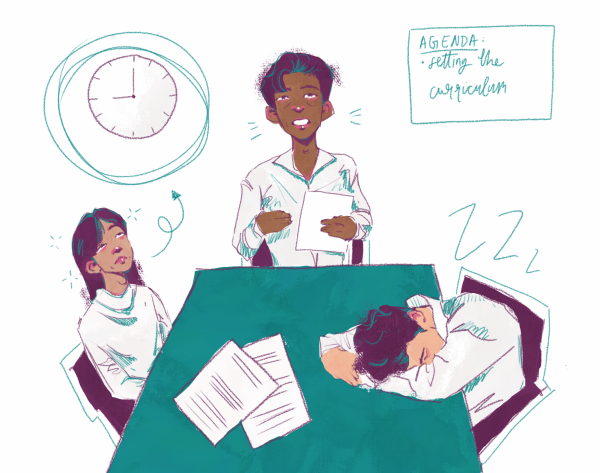Add more teambuilding to advisory curriculum
Advisory should promote honest discussions
Advisory is constructed as a designated time to gather information ranging from graduation and college to bullying and other social-emotional issues. Aside from the few get-to-know you activities done during the team building day, advisory seems to be focused entirely on efficiency.
In the final weeks of freshman year, students from all different circles on the quad meet for the first time in what will become the longest “class” of their high school career.
But quickly, the system diverges into another classroom with just as many lectures and less social interaction.
The teacher advisory (TA) system lends itself to establishing a close-knit group of students whose bond persists throughout the final three years of high school and ought to be treated as such.
Palo Alto High School has received community-wide approval for the TA replacement of the typical guidance counselors, yet Paly is still lacking a space that promotes meaningful conversations among peers. The creation of a safe space to create personal connections away from the threat of academics could greatly benefit Paly students and provide a means for every student to see the struggles of others underneath their calm deceptive personas.
For teenagers, and in Palo Alto especially, the expression of vulnerability is looked down upon. If friends have been created on the basis of humor and laughs, the change of pace could come as an unwanted surprise. Struggles need to be shared, as humans inherently rely on the empathy of others in overcoming our challenges.
Paly should look to enhance honest exchanges between peers by adding to the scope of the advisory system. When students have been given the chance to connect with classmates in a formal situation, the success has been obvious.
“[Shirley] Tokheim has turned her classroom in a safe-zone where all of her students feel comfortable talking to each other about topics that they wouldn’t usually talk to anyone about, which is great,” junior Portia Barrientos said. “What’s really great about Tokheim’s effort is that she realizes that the kind of environment where students are encouraged to have real conversations must exist at all times, not just after a suicide has occurred.”
But with the amount of required learning in each class, it is rare for teachers to have available time to designate for “developing personal connections.” As such, advisory should become the space for students to connect in a meaningful fashion.
Throughout sophomore year, advisories can often be filled with preachy lessons on bullying and academic honesty that, to the vast extent, fail.
“Nothing substantive has been discussed in advisory, say minus the time we had course selections,” sophomore Candace Wang said. “So it’s not particularly useful.”
These less applicable sessions could be cut, and the remaining information could be consolidated so as to allow advisers to utilize the time for community building.
In place of Powerpoint presentations, advisory could host activities that promote non-judgemental interactions. Aspects of the curriculum from the biannual Camp Unity, which serves to breakdown stereotypes and unify a collection of individuals from all kinds of backgrounds, should be incorporated into advisory sessions.
These activities might consist of students blindly stepping backwards or forwards based on their agreement with a list of statements or asking and answering the “36 questions that lead to love” with an unfamiliar face in the room. This would allow for students to expand friendships across cliques in a safe environment.The repetition of these activities beyond sophomore year aids the creation of a community in which each student can express the varying challenges of his or her changing life.
Advisory should be placed immediately following lunch. This change would pressure students into habitually attending the informal class. But at the secondary level, it would show students that advisory is of equal importance to their other classes.
Currently, students feel that the designated time for advisory is undervalued and opportunities to have vulnerable discussions should be more prevalent in the structured school schedule.
“I think [promoting real conversations] is a perspective that the entire school should adopt,” Barrientos said.
By implementing both of these changes, Paly would prove to its students that it values the emotional health and safety of each of its students as much as his or her academic achievement, giving students an EQ to match their IQ.
Your donation will support the student journalists of Palo Alto High School's newspaper












